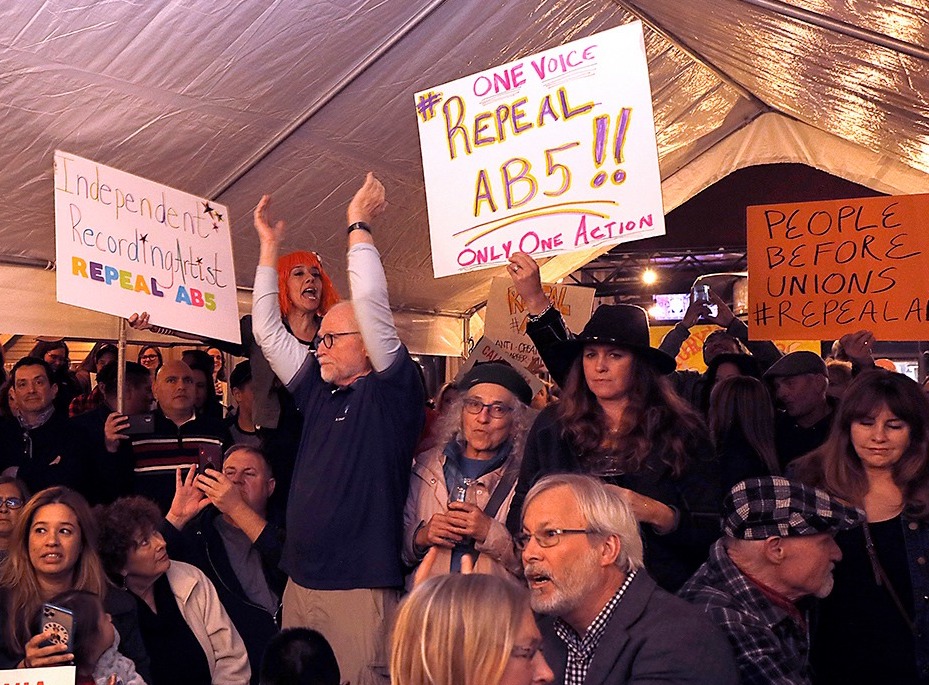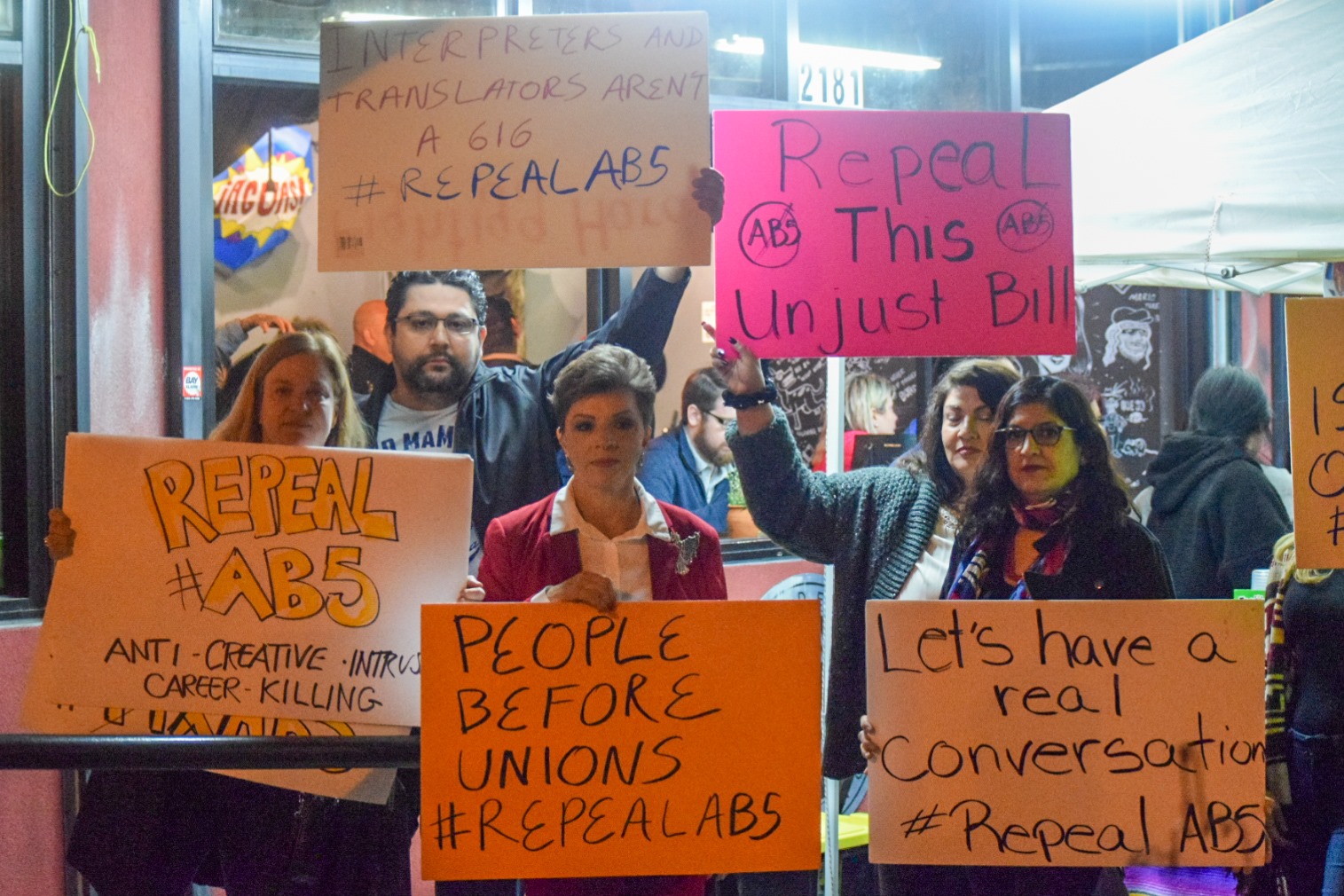The livelihoods of independent business owners and freelancers have been threatened across the country. Federal and state legislators and regulators must prioritize the rights of independent workers.

(Left to Right: Dan Cheatham, independent film maker; Aaron Gayden, band leader; Karen Garrity, music contractor and cellist)
What is the “ABC” Test?
The ABC test is one misguided method regulators can use to determine whether a person is an independent worker, or a w-2 employee. It is based on three characteristics: Is the worker (A) free from the company’s control; (B) in a different line of business than the company; and (C) customarily engaged in the type of work, which is often interpreted as doing similar work for more than one company.
This test is outdated, provides little clarity, and often results in independent contractors being misclassified as employees.
The US DOL’s
Misguided Rule
Under former President Biden’s Department of Labor, a rule went into effect that wreaked havoc on independent business owners and freelancers throughout the US.
The rule created new requirements for defining who is and isn’t an independent worker. As a result, countless independent workers were redefined as employees overnight—even if it’s not what these workers want.
President Trump’s Labor Secretary Lori Chavez-DeRemer has a concerning track record when it comes to independent workers. When she was in Congress, she voted in favor of the Protecting the Right to Organize Act, a controversial bill that included a provision to reclassify hundreds of thousands of freelancers as W-2 employees based on the ABC test.
Our lawmakers need to ensure DeRemer is committed to protecting the rights and freedoms of independent workers.
California’s Cautionary Tale

When California passed a controversial law known as AB 5—which utilized the ABC test—hundreds of thousands of independent business owners and freelancers across the state lost their livelihoods.
The law was so unpopular that people from dozens of industries—including real-estate appraisers, photographers, translators, and recording artists pushed for amendments that would allow them to operate outside of the law, maintaining their independent worker status.
New Threats in New Jersey
In New Jersey Governor Phil Murphy’s Department of Labor and Workforce Development wants to codify its harmful interpretation of the ABC Test into law. The department recently proposed a rule that would threaten the livelihoods of hundreds of thousands of people across the state by implementing this ABC test for independent workers, freelancers, and contractors.
What Workers Are Saying
Independent workers and those who work closely with them are speaking out against this rule.

One group of freelance writers and editors sued the DOL over the rule, saying they “fear that they will lose business due to uncertainty or fear of liability risks.”
A group that advocates for independent workers called Freelancers Against AB5 compiled a list of more than 600 professions that have been negatively affected by restrictions similar to this rule in California.
Hundreds of personal testimonials have been recorded of workers who have been harmed.
The owner of a family-owned trucking business also filed suit over the law, citing concern for the independent workers that his company relies on.
Another business owner warned the rule would hinder her ability to partner with talented individuals – the majority of whom are women – hurting not just her business but the livelihoods of the workers she partners with.
In The Media
Follow the latest news and updates.
-
 Trump Pause on DOL’s Gig Worker Rule Has Industry Wanting More
May 16, 2025
Trump Pause on DOL’s Gig Worker Rule Has Industry Wanting More
May 16, 2025
-
 New Jersey vs. Independent Contractors (w/Kim Kavin & Mike Hruby)
May 13, 2025
New Jersey vs. Independent Contractors (w/Kim Kavin & Mike Hruby)
May 13, 2025
-
 Senate confirms Lori Chavez-DeRemer as Labor secretary
March 10, 2025
Senate confirms Lori Chavez-DeRemer as Labor secretary
March 10, 2025
-
Labor nominee Chavez-DeRemer backs away from pro-union bill February 19, 2025
-
 Trump’s labor secretary pick Lori Chavez-DeRemer expected to face tough grilling during Senate hearings
February 15, 2025
Trump’s labor secretary pick Lori Chavez-DeRemer expected to face tough grilling during Senate hearings
February 15, 2025
-
Representative Kiley Introduces Two Bills to Support Independent Contractors February 13, 2025
-
 Trump Labor Nominee Chavez-DeRemer Gets Committee Hearing Date
February 5, 2025
Trump Labor Nominee Chavez-DeRemer Gets Committee Hearing Date
February 5, 2025
-
Trump DOJ Pauses Legal Challenge to Biden-Era Independent Contractor Rule, Signaling Potential Repeal January 31, 2025
-
 Trump DOL Signals a Back-off from Defending Independent Contractor Rule
January 29, 2025
Trump DOL Signals a Back-off from Defending Independent Contractor Rule
January 29, 2025
-
 Trump DOL Pauses Biden Independent Contractor Rule Defense
January 27, 2025
Trump DOL Pauses Biden Independent Contractor Rule Defense
January 27, 2025
-
 Biden independent contractor rule upheld by US judge
January 10, 2025
Biden independent contractor rule upheld by US judge
January 10, 2025
Ready to Help?
Tell Congress to reject this rule and protect freelancers.
Follow Us
Stay up to date on the latest news and updates.




